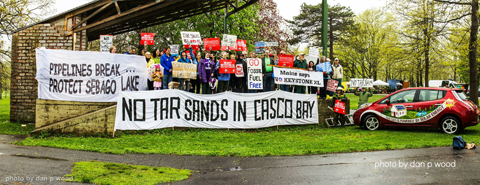 DAMP BUT NOT DEFEATED Protesters gathered in Deering Oaks Park last Saturday to rally against tar
sands. Photo by Dan P. Wood. |
The wind and chilly drizzle did nothing to dampen the spirit of anti-tar sands ralliers in Deering Oaks Park last Saturday, May 17. The event was held as part of a nationwide “Day of Action Against Dirty Fuels,” and, as speaker after speaker told the crowd of about 45 people, they don’t come much dirtier than tar sands.
Dubbed a “carbon time bomb” by NASA scientist James Hansen, tar sands are a type of petroleum deposit containing a mix of sand, clay, water, and an extremely thick, sticky form of crude oil called bitumen, which resembles tar — hence the term “tar sands.” The carbon-intensive stuff is found in underground, and to extract and refine it involves “diluting it with a toxic stew of chemicals,” said Glen Brand, director of the Sierra Club’s Maine chapter, one of several groups that helped organize the rally. What makes it even more dangerous is what happens if it spills. Unlike conventional oil, it doesn’t evaporate.
“The stuff sinks first, and then it sticks to the bottom of the body of water,” Brand said. Activists frequently cite a 2010 tar sands spill in Kalamazoo, Michigan, in which a pipeline was punctured and spilled one million gallons into the Kalamazoo River. “It was the biggest inland oil spill in the history of the country,” Brand said. “The river is still not cleaned up, and there are areas that will never recover.”
That’s one of several reasons Mainers don’t want tar sands being transported through the state — a spill near Sebago Lake, which provides drinking water for Greater Portland, would be catastrophic.
The rally’s purpose was to send a strong “No Tar Sands” message to both President Barack Obama and local officials. While a recent Washington Post-ABC poll showed that about two-thirds of the American public supports construction of the Keystone XL pipeline, which requires a presidential permit to move forward, Obama’s still hemming and hawing; the matter has been in a holding pattern for two years now, with the State Department announcing in April that it would delay its decision until after the Nebraska Supreme Court rules in a related case. “[Obama] said he would not approve it if it threatened climate control, and we want him to honor his promise and say no,” Brand said.
Meanwhile, on the local level, the danger of pipeline reversal bringing tar sands oil into Maine and South Portland still lurks. Protect South Portland, another co-organizer of the rally, narrowly lost in its attempt last fall to block tar sands at the ballot box, but it remains vigilant, convinced that the Portland Pipe Line Company (which they point out is a sub-subsidiary of Exxon) is looking to reverse the flow in its decades-old pipeline to accommodate diluted bitumen from Western Canada. “New infrastructure — like two 70-foot smokestacks in Bug Light Park — was proposed that would turn the town into a conduit for the dirtiest oil on the planet,” said Emily Figdor of Environment Maine, recalling campaign talking points.